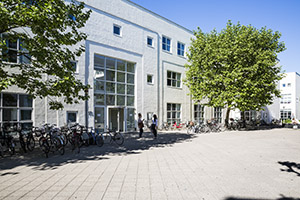Department of Management, Society and Communication
What's happening at MSC:
Third report from government expert group, headed by MSC professor Mikkel Flyverbom |
|
The government expert group on tech giants, which was established in 2021, released its third and final report on 12 December. The third report focuses on ways of designing the digital infrastructure that avoid excessive dependence on the services provided by the tech giants.
|

Minister for European Affairs, Marie Bjerre, Chairman of the expert group, Mikkel Flyverbom, Minister for Digital Government, Caroline Stage, and Minister for Industry, Business and Financial Affairs, Morten Bødskov, at the launch of the report. Photo by Pernille Tranberg. |
|
In connection with the launch, Mikkel Flyverbom and the three Ministers published a newspaper article about the huge impact of the tech giants on contemporary society, and the need for society to gain greater independence from their products and create better opportunities for digital solutions that support existing societal values. Read the article, Enevælden er afskaffet for længst – nu er tiden også kommet til at gøre op med techgiganternes imperier, in Jyllandsposten. Read also the interview, Ekspertgruppe: Ingen dansker bør tvinges på Facebook for at finde ud af, om de er udtaget til weekendens hold, in Politiken.
For further information, contact Mikkel Flyverbom, mf.msc@cbs.dk. |
Article of the Year Award for MSC scholar Oana Albu |
|
 |
|
|
MSC Associate Professor Oana Albu has been announced the winner of Management Communication Quarterly’s Article of the Year Award (best published in 2023) for the article Managing Visibilities: The Shades and Shadows of NGO Work in Repressive Contexts.
|
klik på insert accordion
MSC in the media:
A selection of MSC appearances in the (mostly Danish) media (many more references can be found in the left-hand menu under 'In the Media'):
Introducing MSC:
|
The Department of Management, Society and Communication
The department came into existence on 1 January 2017 as a result of the merger of the Department of Intercultural Communication and Management and the Department of International Business Communication. Read about MSC's research profile here and about its research-based education here.
MSC is located in the Dalgas Have part of the CBS campus. As one of CBS' largest departments, it occupies most of the second floor of the building. |
 |
MSC is home to a number of Centres and research initiatives:
Centre for Sustainability
Centre for Business and Development Studies (CBDS)
The BHRights Initiative - teaching and research on Business and Human Rights
The ESG Academic & Practitioner Network
CogLab - MSC’s facility for experimental research
The Critical Digital Methods Lab.
Further information about MSC
Please contact the MSC Head of Department, Dorte Salskov-Iversen, or the MSC Head of Secretariat, Annika Dilling.
Contact
Department of Management, Society and Communication
Copenhagen Business School
Dalgas Have 15
DK-2000 Frederiksberg
Tlf.: +45 3815 3273
E-mail: rpe.msc@cbs.dk